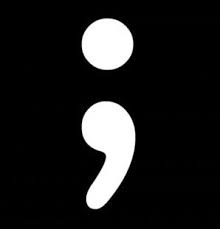
Instructional Materials for Craig White's Literature Courses
|
|
Colons (:) & Semicolons (;)
|
|
Colons and semicolons, like commas and dashes, constitute internal punctuation—they appear inside sentences. Colons and semicolons are not end-punctuation, which appears at ends of sentences like periods, question marks, and exclamation points.
Colons and semicolons perform different functions. Both may appear in the same sentence together.
You can learn to tell colons and semicolons apart by their different functions, but you may also help tell them apart by keeping in mind their different "SOUNDS."
![]()
Colon (:)
SOUND: In sentences a colon almost always appears at the end of an independent clause*. A colon may be followed by either another independent clause or by a fragment or series or fragments.
This pattern makes a colon sound like a build-up or introduction to something that follows which adds to or completes the meaning.
The "pause of anticipation" between that build-up and its fulfillment is where the colon appears.
Examples:
"There is one thing a human being simply cannot do without: hope."
"Her goal was easily stated: the state championship."
"Please bring me the following items: butter, sugar, and flour."
"One factor cannot be ignored: the bottom line."
"There was only one question left to answer: who had sent her the first warning?"
"Don't overlook the most important rule: never argue with the boss."
"I want an assistant who can do the following: (1) input data, (2) write reports, and (3) complete tax forms."
*Independent clause = a set of words that could stand alone as a complete sentence but may be incorporated into a larger sentence.
For example, a compound sentence has two or more independent clauses: "It was a bright cold day in April, and the clocks were striking thirteen." (George Orwell, Nineteen Eighty-Four, 1949)
In the sentence, "I was there when he arrived," the independent clause is "I was there"; "when he arrived" is a dependent clause because it cannot stand alone as a separate sentence. ("when he arrived" is a clause because it has a subject and a verb.)
* * *
Most common well-intentioned mistake with a colon: "Always use a colon before a list." THIS IS SOMETIMES BUT NOT ALWAYS TRUE. Not all lists require colons, and every colon isn't followed by a list.
A colon should not precede a list unless it follows a complete independent clause.
INCORRECT: If a waitress wants to make a good impression on her customers and boss, she should: dress appropriately, calculate the bill carefully, and be courteous to customers. ("she should" by itself is not a complete independent clause.)
CORRECT: If a waitress wants to make a good impression on her customers and boss, she should dress appropriately, calculate the bill carefully, and be courteous to customers.
If you want to write that sentence with a colon: If a waitress wants to make a good impression on her customers and boss, she should do the following: dress appropriately, calculate the bill carefully, and be courteous to customers.
Another list without a colon: I want an assistant who can input data, write reports, and complete tax forms.
If you want to write that sentence with a colon: I want an assistant who can perform several essential tasks: input data, write reports, and complete tax forms.
* * *
Positively, the job of the colon is simple: to introduce.
1. Use a colon to introduce a list that follows an independent clause:
- There are three countries in North America: Mexico, the USA, and Canada.
- We can see many things in the sky at night: the moon, stars, planets, comets, airplanes, and even satellites.
2. But what is introduced doesn't have to be a list. You can use a colon to introduce a single item, especially when you want to emphasize that item:
- We were all waiting for the hero of the evening: John.
- There is one thing that he will not accept: stupidity.
- The job of the colon is simple: to introduce.
3. Use a colon to introduce direct speech or a quotation when the introduction to the quotation is a complete independent clause:
- He stood and spoke so that everyone could hear: "Ladies and Gentlemen, please be seated."
- John whispered in my ear what I knew he would ask: "Have you seen Andrea?"
- The ancient words of Confucius speak a modern truth: "When words lose their meaning, people lose their freedom."
4. Use a colon to introduce an explanation:
- We had to cancel the party: too many people were sick.
- There is no need to rush: the meeting will be starting one hour late.
![]()
Semicolon (;)
The "sound" of a semicolon is different from that of a colon. Instead of leading up to something, a semicolon signals balance between equivalent or parallel items. Ideally (but not invariably) the clauses or phrases on either side of the semicolon have parallel structure or form.
Examples:
"Happiness isn't something you experience; it's something you remember." (Oscar Levant) (Parallel: subject-verb-noun clause.)
"Everything about our sessions pleased me: the smallness of the room; the noise of the janitor's broom hitting the edge of the long hallway outside the door; the green of the sun, lighting the wall; and the old woman's face blurred white with a beard." (Richard Rodriguez, Hunger of Memory: The Education of Richard Rodriguez (1981). (Each of the phrases after the colon is roughly parallel in structure: "the [noun] of the [noun], [verb form] the [noun]
A semicolon may perform the following functions:
![]() Link two
independent clauses to connect closely related ideas.
Link two
independent clauses to connect closely related ideas.
Example: Some people write with a word processor; others write with a pen or pencil. (Parallel structure: noun-verb-prepositional phrase)
![]() Link clauses connected by
conjunctive adverbs or
transitional phrases to connect closely related ideas
Link clauses connected by
conjunctive adverbs or
transitional phrases to connect closely related ideas
Example: However people choose to write, they are allowed to make their own decisions; as a result, many people swear by their writing methods. (This example is less perfectly parallel but still correct.)
![]() Link lists where the items contain commas to avoid confusion between list
items
Link lists where the items contain commas to avoid confusion between list
items
Example: There are basically two ways to write: with a pen or pencil, which is inexpensive and easily accessible; or by computer and printer, which is more expensive but quick and neat.
![]() Link lengthy clauses or clauses with commas to avoid confusion between
clauses
Link lengthy clauses or clauses with commas to avoid confusion between
clauses
Example: Some people write with a word processor, typewriter, or a computer; but others, for different reasons, choose to write with a pen or pencil.
Additional advice re semicolons
 Avoid using a comma when a semicolon is needed:
Avoid using a comma when a semicolon is needed:
Incorrect: The cow is brown, it is also old.
Correct: The cow is brown; it is also old.
Also
Correct: The cow is brown, but it is also old.
 Avoid using a semicolon when a comma is needed:
Avoid using a semicolon when a comma is needed:
Incorrect: The cow is brown; but not old.
(independent clause; dependent clause)
Correct: The cow is brown,
but not old.
Incorrect: Because cows smell; they offend me.
(dependent clause; independent clause)
Correct: Because cows smell, they offend me.
Incorrect: I like cows, however, I hate the way they smell.
(two independent clauses without a conjunction)
Correct: I like cows; however, I hate the
way they smell.
![]()
Additional notes on the colon:
About.com: A mark of punctuation ( : ) used after a statement (usually an independent clause) that introduces a quotation, an explanation, an example, or a series.
In addition, the colon usually appears . . .
after the salutation of a business letter (Dear Professor Legree:);
between the chapter and verse numbers in a biblical citation (Genesis 1:1);
between the title and subtitle of a book or article (Comma Sense: A FUNdamental Guide to Punctuation);
and between numbers or groups of numbers in expressions of time (3:00 a.m.) and ratios (1:5).
* * *
More examples of colon usage
"The four most beautiful words in our common language: I told you so." (Gore Vidal)
"My loathings are simple: stupidity, oppression, crime, cruelty, soft music." (Vladimir Nabokov)
"I have never made but one prayer to God, a very short one: 'O Lord, make my enemies ridiculous.' And God granted it." (Voltaire)
"It is by the goodness of God that in our country we have those three unspeakably precious things: freedom of speech, freedom of conscience, and the prudence never to practice either of them." (Mark Twain)
"Death has got something to be said for it:
There's no need to get out of bed for it;
Wherever you may be,
They bring it to you--free."
(Kingsley Amis, "Delivery Guaranteed," 1979)
* * *
Several definitions, rules, and examples on this page have been adapted from the following websites: http://grammar.about.com/od/c/g/colon.htm, http://www.grammarbook.com/punctuation/colons.asp, http://www.essortment.com/grammar-punctuation-proper-use-colon-61245.html, http://writing.wisc.edu/Handbook/Semicolons.html, http://grammar.about.com/od/rs/g/semicolonterm.htm, and http://www.englishclub.com/writing/punctuation-colon.htm.


